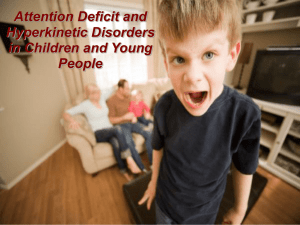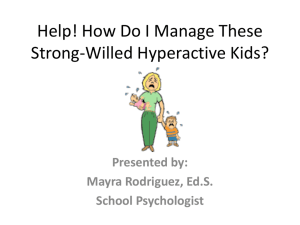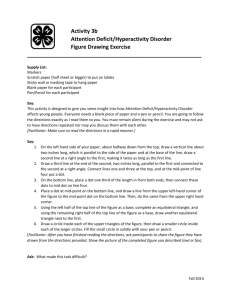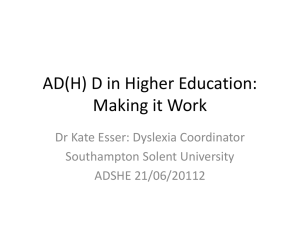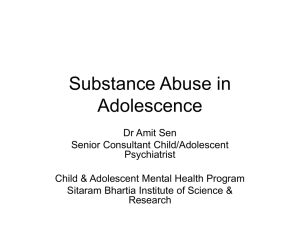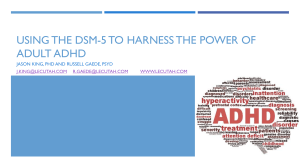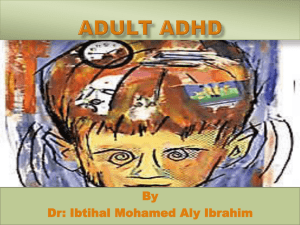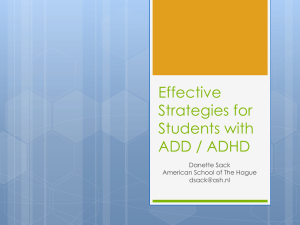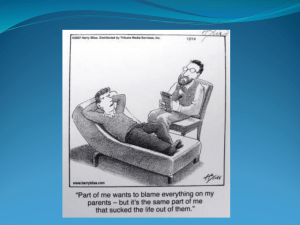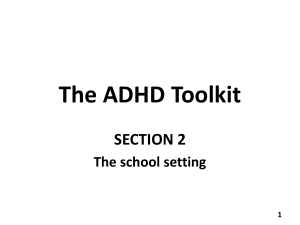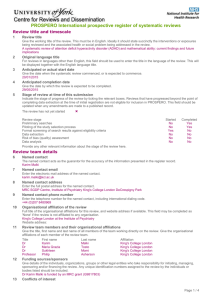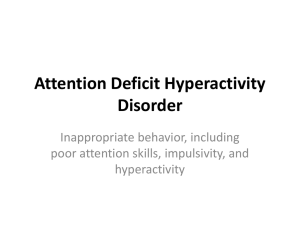Dr. Miriam Pizzani`s PowerPoint presentation on ADHD
advertisement
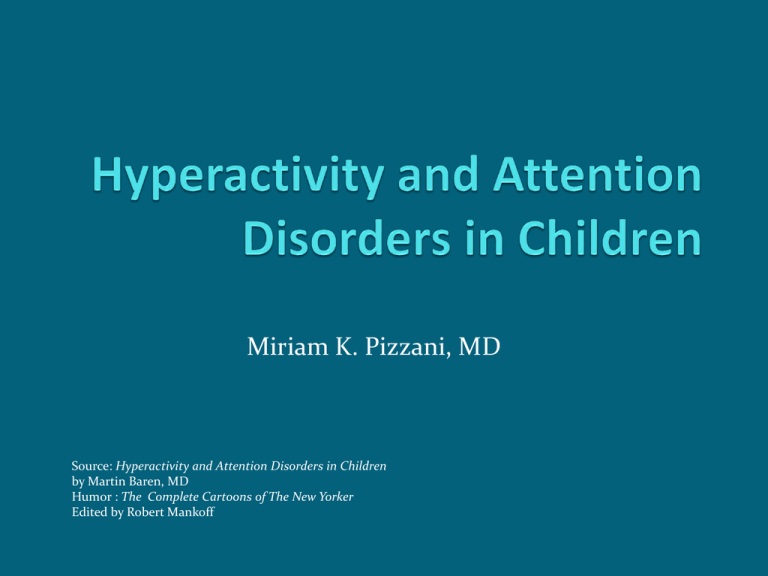
Miriam K. Pizzani, MD Source: Hyperactivity and Attention Disorders in Children by Martin Baren, MD Humor : The Complete Cartoons of The New Yorker Edited by Robert Mankoff Symptoms of an ADHD Child With Hyperactivity (impulsive) Is fidgety Leaves seat when shouldn’t Runs or climbs inappropriately Talks excessively Has difficulty playing quietly Is always on the go Blurts out answers Has trouble waiting turn Interrupts Without Hyperactivity (inattentive) Has difficulty following through on instructions Has difficulty keeping attention on tasks or play activities Loses things necessary for tasks and activities at school and at home Doesn’t listen Fails to give close attention to details Seems disorganized Has trouble with tasks requiring long term mental effort Is forgetful Is easily distracted “Why take it so hard - there’s lot’s of other girls in the world, aren’t there?” “I know, but what am I going to do tonight?” Myths about the Causes of ADHD It is generally accepted that none of these cause ADHD- although some may cause increased problems for a child with ADHD Too much sugar Television Too little sugar Florescent lighting Aspartame Video games Food sensitivity Food additives/coloring “Well, stupid, don’t just sit there.” Cautions If your child’s behavior does seem to change after a any particular food or drink, make a note Try keeping the child off that substance, and see if there is any improvement Gluten intolerance (wheat flour, rye ,barley -malt) avoid for a 3 month trial “What other bad words do you know?” Why do some children develop ADHD while others do not? Not all children who have inherited a tendency towards ADHD will develop it. The following factors can make it more likely to emerge: Factors during pregnancy: Alcohol abuse Drug abuse Poor maternal nutrition Chemical poisons , like lead Factors after birth: Brain injuries during or after birth Infections Iron deficiency anemia Chemical poisons, like lead “Now can you hear me – you boys in the back?” At what age does ADHD begin? Many parents are amazed that their children have ADHD, because at home they noticed no difficulty. Indeed they may report that the child can watch television or play video games for hours, with no sign of attention disorder. How could such a child have ADHD? The answer is simple. Television and video games offer the type of stimulation that helps these children to focus. These passive situations, in which the children are actually being stimulated from outside. In other words, attention span during these types of tasks is not important for the diagnosis. “Sh, Darling. Daddy’s afraid he’ll have to work in New Jersey!” Previous Names For ADHD Postencephalitic Disorder Hyperkinetic Syndrome Minimal Brain Damage Minimal Brain Disorder Hyperkinetic Reaction Attention Deficit Disorder of Childhood (with or without hyperactivity) “Oh, she’s been acting that way all day. Someone told her she looks like Katharine Hepburn.” Important Factors During Diagnosis Explore all of the possibilities that could explain the child’s behavior Find if there are any additional problems such as learning disabilities, conduct disorders, depression, anxiety, or various physical illnesses Know about the family structure, classroom situation, and any special conditions or problems Have a good idea of the child’s thinking ability and academic skills Bully Small Fry Criminal Types Peeping Tom Sadist Pyromania c Liar Tattle-Tale Cheat The child’s therapy should always include help for classroom problems. For example the teacher should: Write directions on the board Break instructions into small steps Have the child sit in front of the class Give more time for tests and writing assignments Remind the child to turn in homework Provide a structured learning environment Let the child use tape recorders to record lessons Use simplified textbooks Tailor homework assignments Ignore negative behavior as much as possible Do not give bad marks for the child’s work because of difficulties caused by the attention disorder Do not punish the child because of difficulties arising from lack of organization or problems with attention “Don’t just stand there – get witnesses!” Managing the ADHD Child at Home Children usually look for some type of attention from their parents- positive or negative. ADHD children often get negative types of reinforcement. When children do well, they should be encouraged and rewarded. This is positive reinforcement. Be positive with the ADHD child Tell the child often that he or she has a special problem with concentration and impulse control. It’s helpful if the children fully understand their condition and how it affects them, both at school and at home. “If this doesn’t get us in, nothing will.” Managing the ADHD Child at Home Be very consistent in the way you treat your ADHD child, and provide quite a bit of structure at any age. This means that the children should always know exactly how they stand in a certain situation, and how far they can push, as well as what will happen if they cross the line. Like all children, ADHD children do much better in school if they eat a good, nutritious breakfast. “We forgot to bring the children!” What are the Benefits of Medication? More control over conduct, social behavior, impulsiveness, and aggressive behavior Improvement in attention span-especially in school Dramatic improvements in the quality and quantity of school work in general, including handwriting , finishing tasks, the rate of accomplishment of certain academic skills, and classroom behavior Better relationships with peers and family members Children will often become calmer, more organized, and less stubborn. In addition to improvements in the way they get along , there will be general increase in self esteem “I’m sure Baby’s in here somewhere.” Other Medications Drug Description How it Works Comments Imipramine Desipramine Nortriptyline Antidepressants Improves the supply of neurotransmitters in the brain Improve mood Improvement in impulsivity, hyperactivity, and attention Bupropion Antidepressant Improves mood and possibly attention. Works on neurotransmitters Help for ADHD symptoms – mostly in adults Adderall Vyvanse Amphetamines Stimulates brain neurotransmitters Improvement in impulsivity, hyperactivity, and attention Other Medications Drug Description How it Works Comments Thioridazine Usually given for severe emotional problems Can help behavioral difficulties by changing brain chemistry Useful in very small children with ADHD Lithium Lithium is an antimanic drug Works on the brain chemistry Useful in calming aggression in children Fluoxetine Sertraline Treats depression in adults, including obsessivecompulsive problems Works on brain neurotransmitters Helpful in children with attention disorders who are also depressed In Summary Once your child has been diagnosed by qualified professionals as having ADHD, you will need to face the fact that the condition is unlikely to go away. The good news, however, is that a great deal can be done to help your child, particularly if you follow these guidelines: Work with health professionals to get the most effective medical treatment Work with the school to get the most beneficial classroom situation Know your child – understand what situations make the condition worse Remember that with help, your child can grow up to be a successful adult “Of course it’s much too early to draw conclusions. The Harvard entrance examinations will tell the story.”
